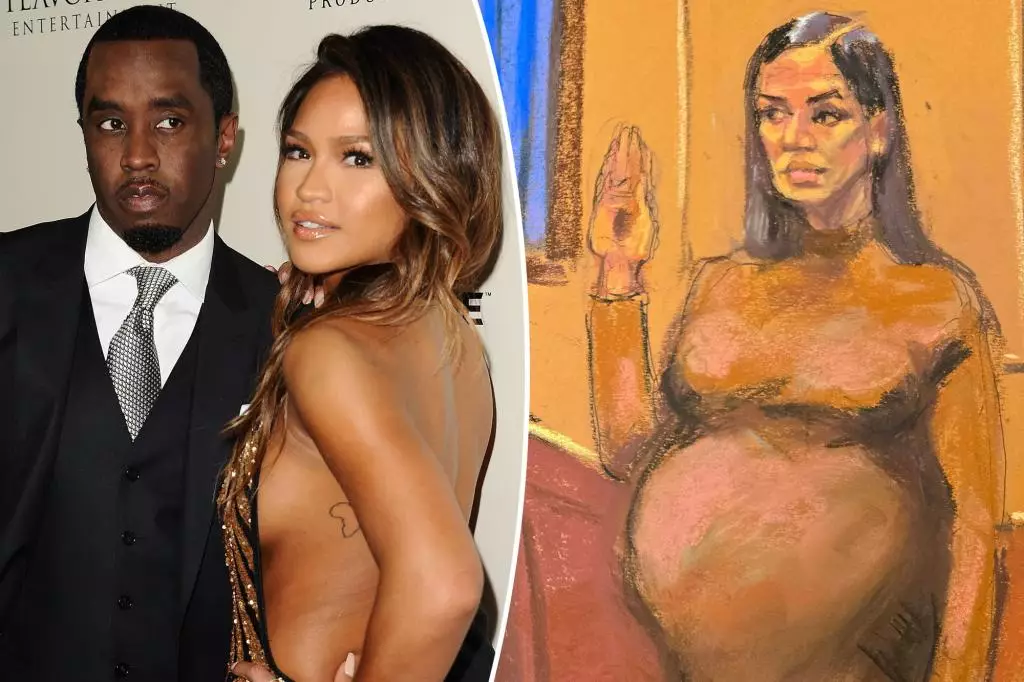In recent hearings that have gripped the public’s attention, Cassie Ventura, known professionally as “Cassie,” took the stand to recount her harrowing experiences during her tumultuous relationship with Sean “Diddy” Combs. This testimony is part of a larger trial centered around allegations of sex trafficking, abuse, and a plethora of other crimes attributed to the renowned hip-hop mogul. Cassie’s disclosures delve deeper than mere gossip; they raise unsettling questions about the pervasive culture of violence and exploitation that is often tragically normalized within the celebrity sphere.
Cassie boldly revealed the existence of orchestrated parties, dubbed “Freak-Offs,” which she claimed became an integral part of her existence during their decade-long relationship. The chilling description of such events paints a picture of not only entertainment but also manipulation and coercion. The rhythm and atmosphere of these parties, which Cassie described as being akin to a job, challenge the romanticized narratives often spun about celebrity life. Instead of glamour, she communicated a sense of entrapment—where recovery was paramount after such obligations, emphasizing the toll they exacted on her emotional and physical well-being.
Violence Concealed by Glamour
The juxtaposition of Cassie’s glamorous career as a model with the violence she endured is striking. She narrated episodes where Diddy would lash out physically, reflecting a horrifying reality hidden beneath the surface of public perfection. “He would bash me on my head, knock me over, drag me, kick me,” Cassie testified, detailing behaviors that are unequivocally abusive. Such admissions not only shatter the façade that figures like Diddy might project but also underscore the dangers faced by individuals who find themselves within the orbit of wealth and fame.
One chilling remark from Cassie described an atmosphere filled with fear—an emotional landscape where even “making the wrong face” could provoke violence. This reality blurs the lines between love and fear, making it painfully clear how love can sometimes be a weapon in the hands of exploitative partners. Cassie’s revelations challenge listeners to confront the appalling dynamics of power and violence in relationships, especially where one partner holds cultural sway and economic leverage.
The Murky Waters of Accountability
Following the allegations, Diddy’s initial denial contrasted starkly with Cassie’s narrative, highlighting a familiar pattern often seen in cases involving powerful figures. The subsequent settlement between Diddy and Cassie, which occurred within a day of her lawsuit filing, raises questions about accountability and justice. A why-now question resonates: Why do victims often feel the need to settle rather than fight for public accountability? It often reflects a reality where intimidation, financial power, and public scrutiny create insurmountable barriers for the aggrieved.
Furthermore, the shocking testimony about Diddy allegedly attempting to bribe an LAPD officer to silence accusations paints a disturbing portrait of a man who feels emboldened by his wealth and status. This raises critical discussions about the intersection of privilege and justice—how those with means often manipulate systems to cater to their whims while leaving victims unheard and marginalized. Diddy’s trial and the multitude of lawsuits he faces from various individuals underscore a significant moment where fame intersects with legal repercussions for misconduct.
Creating a Cultural Conversation
Cassie’s actions extend beyond her personal experience; they contribute to a broader cultural conversation about the treatment of women in the entertainment industry and the systemic challenges they face. The allegations against Diddy are not just isolated incidents but part of a larger societal issue where abuse is often overlooked in favor of maintaining public personas. The #MeToo movement highlighted such dynamics, but Cassie’s story specifically alerts us to corners of the industry that remain obscured despite the spotlight.
As Cassie’s testimony unfolds, it invites an introspective examination of how society engages with celebrity culture. It prompts us to challenge our complicity in upholding toxic narratives surrounding powerful men and to advocate for a paradigm shift that acknowledges and addresses the trauma experienced by women like Cassie. Let her courage be a catalyst for change—a move toward a cultural re-examination of accountability, empathy, and the protection of every individual’s dignity, regardless of their status.

